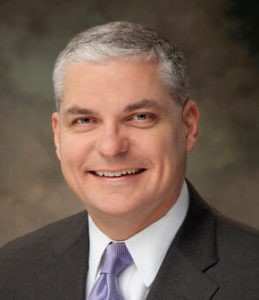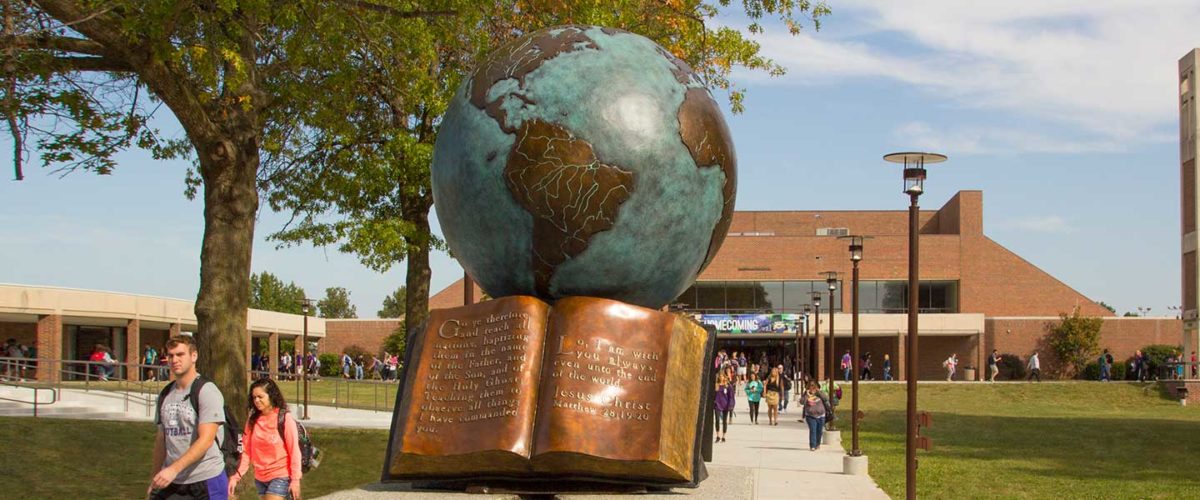Missouri Baptists continue to find themselves at the epicenter of the struggle between fundamentalism and non-fundamentalism that has dominated the Southern Baptist Convention publicly since 1979.
The latest casualty is Eric Turner, who abruptly resigned as president of Southwest Baptist University in Bolivar, Mo., Oct. 20, just two years after being elected to the post.

Eric Turner
Perhaps no other state Baptist convention has experienced more litigation and ongoing strife than the Missouri Baptist Convention, which for 16 years was tangled up in court over the ownership of five former agencies that amended founding documents to no longer grant the convention the privilege of nominating and electing trustees, moving to self-perpetuating trustee boards.
After fundamentalists gained control of the Missouri Baptist Convention in the late 1990s, ongoing controversy escalated, leading to the 2006 expulsion of 19 churches aligned with the Cooperative Baptist Fellowship. Today, an alternative state group called Churchnet serves as a coalescing ministry for churches removed or disaffected by the older state convention.
The Missouri Baptist Convention and its remaining agencies have continued a rightward march in theology and practice since then, and the turmoil at Southwest Baptist University is part of that trend.
The original state convention is left with six affiliated ministries — Missouri Baptist Children’s Home, Missouri Baptist Foundation, Missouri Baptist Home, Missouri Baptist University, Hannibal LaGrange University and Southwest Baptist University.
What’s going on at Southwest Baptist?
This small private college was founded in 1878. According to US News and World Report data, it has a total undergraduate enrollment of 2,588 and total enrollment of 3,281; its setting is rural; and the campus size is 152 acres. In the 2021 edition of Best Colleges and Regional Universities Midwest, Southwest Baptist ranks 112.
In recent years, the university has been embroiled in controversy over its religion faculty, with charges from more conservative Missouri Baptists that faculty members were too liberal — a common theme in denominationally based colleges and universities.
Word&Way magazine described the background this way: “Turner fired Clint Bass, a religion professor, in 2018 for violating the school’s faculty handbook after Bass met with Missouri Baptist Convention leaders and others in an effort to allegedly drive out other professors in SBU’s Redford College of Theology and Ministry. As Bass unsuccessfully appealed his termination, he released documents leveling charges against those professors that the professors criticized as inaccurate.”
In October 2019, the Missouri Baptist Convention replaced the university’s entire slate of trustees to put five new trustees on the board.
In October 2019, the Missouri Baptist Convention replaced the university’s entire slate of trustees to put five new trustees on the board. In his report to the convention’s annual meeting, Turner criticized that action, which deviated from a previous pattern of collaborative board nominations. This year, the convention officially amended its Nominating Committee rules to align with its actions last year and give more absolute authority in trustee selection to the convention.
Announcing his sudden resignation, Turner said: “As the University and Missouri Baptist Convention rearticulate their long-standing relationship, I think it is vital for the two entities to have a fresh start with a new leader at the helm.”
Brad Johnson, vice president for institutional advancement, has been named acting president.
Accreditation problems
Meanwhile, a St. Louis attorney has filed a complaint against the university with The Higher Learning Commission, which provides the school’s overall accreditation. The commission announced Aug. 24 that it found the complaint credible enough to begin a review.
The complaint lodged Aug. 21 by Russell Jackson, who graduated from the school in 1987, references the turmoil over religion faculty and perceived interference by the state convention.
No further information has been made available by the university about its response to the complaint, even though the allowed 30-day response period has lapsed.
However, Word&Way reports that since the complaint was filed, university trustees “approved proposed new governing documents that include changes Missouri Baptist Convention leaders demanded. Such changes included adopting the Baptist Faith & Message 2000 and granting the Missouri Baptist Convention the legal status as sole corporate member.”
The latter legal maneuver has been used by the Southern Baptist Convention and other state Baptist conventions to prevent their schools and affiliated ministries from seceding and declaring self-perpetuating boards. And changes made in the 2000 version of the Baptist Faith & Message doctrinal statement is what led hundreds of churches to break ties with the SBC and dozens of missionaries to resign in protest.
New governing documents require religion professors to “annually affirm” four doctrinal statements.
Word&Way reported that the new governing documents require university religion professors to “annually affirm” the Baptist Faith & Message 2000, as well as the 1978 Chicago Statement on Biblical Inerrancy, the 1988 Danvers Statement on Biblical Manhood and Womanhood, and the 2017 Nashville Statement on sexuality. Those three additional documents are among the most conservative doctrinal statements currently used by evangelical organizations in America. The Danvers Statement, for example, advocates distinct God-given gender roles for men and women and a view of male-female relationships known as complementarianism.
Trustees attack Word&Way
Word&Way has been the primary news outlet reporting on the controversies at Southwest Baptist University. The newspaper previously was an affiliated ministry of the Missouri Baptist Convention but in 2001 joined four other entities to declare a separation and move to self-perpetuating boards.
The most conservative university trustees have not been pleased with Word&Way reporting on their actions and other issues. So on Sept. 28, two of those trustees used an internet broadcast to attack the publication and its editor, Brian Kaylor.

Adam Cochurn (left) and David Van Bebber talk in their studio as Tim Carter joins in remotely.
Trustee David Van Bebber and friend Adam Cochrun co-host a weekly podcast titled “T.A.G. You’re It.” During a Sept. 14 podcast, the hosts responded to a Word&Way report on the university, and then the next two weeks, Sept. 21 and 28, university trustee Tim Carter joined them for two hour-long conversations about Word&Way and Southwest Baptist University.
Carter was among the five trustees elected to the university’s board last year in the unprecedented move by the Missouri Baptist Convention. Also last year, Van Bebber distributed a document attacking university religion professors.
Besides challenging Word&Way on several points, the three men defended the university’s new requirements for faculty to affirm the set of four doctrinal statements.
Said Cochrun: “Baptists are creedal people, and we’re just acting like Baptists.” Carter and Van Bebber expressed their agreement with Cochrun.
Their view on creeds runs counter to most seminary teaching on Baptist history, where great pains are taken to distinguish between “creeds” and “doctrinal statements.” The primary creeds recited weekly by other Christian groups — the Nicene Creed and the Apostles’ Creed — are not typically used in Baptist worship. For decades, Southern Baptist ministers were taught by seminary professors, “We have no creed but the Bible.”
For decades, Southern Baptist ministers were taught by seminary professors, “We have no creed but the Bible.”
A document produced by the Baptist General Association of Virginia, for example, explains the history: “A confession of faith, whenever it was written, was never imposed upon believers as a test of orthodoxy. It was a statement of what a person or persons believed, rather than what they must believe. A creed, on the other hand, is a binding summary to which legal status is assigned and to which conformity is required on the part of an individual within an organization. Creeds are regarded as permanently binding and can only be altered officially by those at the top of the organization, which is a very difficult and painful process.”
SBC ethics leader Russell Moore in 2004 poked fun at Cooperative Baptist Fellowship leaders for having opposed the Baptist Faith & Message as “creedal” but being all-too-willing to employ the Apostles’ Creed in worship.
Throughout the battle for control of the SBC that began formally in 1979 and ended with the adoption of the Baptist Faith & Message 2000, seeking doctrinal purity and uniformity has been a rallying cry. That ever-narrowing definition has continued inside the SBC even after most of the “moderates” or “liberals” left the denomination.
Related articles:
Faced with generational crisis, Christian universities eye two paths
Deconstructing the crisis of Christian colleges and the culture wars


